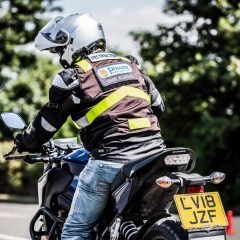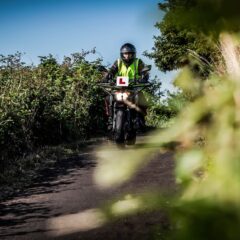
7 Top Motorcycle Accessories
With Christmas just around the corner, you might be wondering what to get your favourite motorcycle enthusiast or even a little something for yoursel...
 Phoenix Motorcycle Training LTD
Phoenix Motorcycle Training LTD
 Phoenix Motorcycle Training LTD
Phoenix Motorcycle Training LTD

If you live, breathe and dream motorcycles, becoming a motorcycle instructor might be your dream career. There are different types of motorcycle instructor courses, depending on the kind of motorcycle instructor you want to be. Training riders for their licence, teaching riders how to feed their need for speed safely on a track, or getting down and dirty as a trail riding instructor are just three ways to make motorcycling your day job.
Becoming a motorcycle instructor is a rewarding and fun career move. You’ll be able to work full-time or part-time, get the satisfaction of passing on your passion to others and learn a thing or two about motorcycling too. You’ll become a better rider by becoming a motorcycle instructor.
In this blog, we explore the different paths to becoming a motorcycle training instructor. Whether you want to get riders ready for a motorcycle licence, train riders on track days, or get mucky off-road riding, this blog is for you!
Before you start answering job ads with approved training bodies (ATB) for motorcycle training instructors, you’ll need a few things:
Whatever type of motorcycle instructor you want to become, your role is essentially teaching riders. You could be coaching new riders, preparing CBT riders for a full licence, or showing experienced riders how to make the most of their time on two wheels.
That’s why all of our motorcycle training instructors hold a Level 3 Award in Education and Training. This gives our motorcycle instructors the skills they need to adapt their teaching style to their students. It’s a foundation in teaching that can be used for any training, coaching or teaching role.
The short course gives budding motorcycle instructors an understanding of different teaching methods and styles. That makes them better instructors. It also gives them a strong start to becoming a motorcycle instructor in any situation.
The kind of motorcycle instructor you want to become influences the kind of training you’ll need. For motorcycle licence training, you’ll need to get in touch with an approved motorcycle training body (ATB). Let them know you want to become a motorcycle training instructor. They’ll set up a shadow day for you to make sure this is for you. If it is, you’ll be down-trained by one of their qualified instructors.
If you reach out to us, we’ll also support you through the Level 3 AET training. Not all ATBs require their motorcycle instructors to take this course. We think it’s essential because it gives you skills for training adults and a recognised teaching qualification.
Once you’ve reached the required standard in down-training, you’ll be qualified to teach new riders only at that motorcycle training school for CBT certificates. If you’d like to broaden your horizons and teach CBT courses at any motorcycle training school, you’ll need to take the DVSA 2-day training course.
This course covers instructional techniques for taking new riders through Compulsory Basic Training. You’ll also get:
To train students for their full UK motorcycle licence, you’ll need further training. This step starts with down training from the qualified instructors at your ATB. However, once this training is complete, you won’t be able to take students for motorcycle licence training straight away. You must complete a 1-day training course at a DVSA training and development centre first.
You’ll need to meet high standards with ATB down training and DVSA training. That’s because you need to be confident and competent at teaching others to ride safely and to a level that lets students pass their motorcycle licence tests.
The DVSA’s 1-day DAS training includes:
The 1-day training is intense, but you’ll develop your patience and skill. When you pass, you’ll need to tell your ATB your result and complete a form 4 to register as a DVSA-certified motorcycle instructor.
Trail riding instructors are a little different. You’ll need a full motorcycle licence to ride on public roads and that includes the UK’s green lanes and Byways. These are often referred to as BOATs.
You won’t need any motorcycle licensing training, but you will need loads of off-road experience. An enthusiasm for sharing your passion with other riders will also stand you in good stead too.
If you want to make dirt bike coaching your career, you’ll need to get in touch with the ACU. They have training courses for coaching kids and competition riders. Once you pass their motorcycle training, they’ll register you as an ACU Certified Sporting Coach for off-road motorcycles.
Each track day event company has a different process for assessing instructors and accepting them to the team. Many of the instructors you find at track day events are road instructors, current or past racers, and experienced track day enthusiasts.
Motorsports Vision Trackdays have a small and dedicated group of track day instructors who are paid for their expertise. Some track day events companies work with volunteer instructors. Volunteering as a track day instructor can be a great way to gain experience for landing a paid position.
If you’re applying for a paid position as a track day motorcycle instructor, you’ll need to prepare well.
Once you’ve successfully completed the process, you’ll be invited to join the team of track day motorcycle instructors on a permanent basis. This could be a full or part-time role.
If you love riding a motorcycle, either on-road, off-road or on tracks like Brands Hatch, becoming a motorcycle instructor is a fantastic career. Choose the path to becoming the motorcycle trainer that excites you most; there’s a motorcycle instructors course that’s right for you.
We train motorcycle instructors for full and part-time roles at our motorcycle training schools across the UK. If you’re passionate about sharing your love of motorcycling with others, we’d love to hear from you. Get in touch about becoming a motorcycle licence training instructor with us today!

With Christmas just around the corner, you might be wondering what to get your favourite motorcycle enthusiast or even a little something for yoursel...

If you love motorcycle riding, you’ve probably daydreamed about riding a motorbike for a living. A professional racer or stunt rider is OK for some...

Getting a UK motorcycle licence can seem a complicated process. Particularly when compared to a driving licence for a car. Whether you choose the pro...
This website uses cookies to personalise content, ads, and analyse traffic, sharing data with partners who may combine it with other information. See our Privacy Policy for more information.